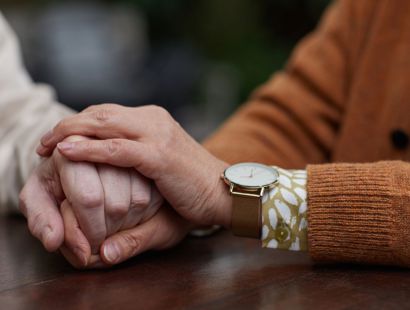
Assisted Dying Bill 2024—where are we?
Following the news that MPs have voted in favour of proposals to legalise assisted dying in England and Wales, legal director Vanessa Collins explains the current law, what is contained within the bill, and what happens next.
It’s been hard to miss the recent headlines regarding the controversial proposed new law to legalise assisted dying for terminally ill adults in England and Wales.
The Private Member’s Bill - officially called the Terminally Ill Adults (End of Life) Bill - would make it legal for over-18s who are terminally ill to be given assistance to end their own lives.
The Bill was put forward by the Yorkshire Labour MP Kim Leadbeater in mid-October 2024 and if ultimately passed would give terminally ill adults in England and Wales with just six months to live the choice to end their lives.
Significant steps towards legalising assisted dying were made on 29 November after a five-hour debate in the Commons in which MPs voted 330 to 275 in support of the assisted dying bill.
Undoubtedly, this is an important moment in social policy, with MPs giving provisional approval to a law that essentially allows the state to assist its citizens to die - albeit in very restricted circumstances.
What is the current law?
As the law stands, assisted suicide is illegal in England, Wales and Northern Ireland, with a maximum prison sentence of 14 years.
In Scotland, it is not a specific criminal offence but assisting the death of someone can leave a person open to being charged with murder or other offences. Therefore, the law throughout the UK prevents people from asking for medical help to die.
It must be further noted that anyone who helps someone to travel abroad to die in a country where assisted dying is legal, such as Switzerland or Canada, could face prosecution. Switzerland has allowed assisted suicide since 1942 and it’s Dignitas facility began operating in 1998. Dignitas accepts foreign patients as well as Swiss nationals, and reports between 1998 and 2023 it helped 571 Britons to die.
It’s an option already available to more than 200 million people across the world, including those in Belgium, Luxembourg and the Netherlands – as well as in ten American jurisdictions, and Victoria in Australia.
Kim Leadbeater MP insists that in Britain, assisted death would include “the strictest safeguards anywhere in the world”.
What is assisted dying?
The phrase 'assisted dying', and the language used, varies depending on either side of the debate.
Dignity in Dying, a pro-change campaign group, say that assisted dying allows a person with a terminal condition the choice to control their death if they decide their suffering is unbearable.
They argue that, along with good care, dying adult people who are terminally ill and have mental capacity deserve the choice to control the timing and manner of their own death. They state: "we believe the right law for the UK is one that allows dying people, with six months or less to live, the option to control their death.”
One of the highest profile advocates for the bill is broadcaster Dame Esther Rantzen who has been diagnosed with stage four lung cancer. She said to BBC News: “if I decide that my own life is not worth living, please may I ask for help to die?”
However, the campaign group Care Not Killing, who oppose the bill, uses the terms 'assisted suicide' and 'euthanasia', and argues that the focus should be on “promoting more and better palliative care” at end of life rather than any law change.
Diane Abbot and Sir Edward Leigh who have been MPs for 37 and 41 years respectively united to oppose the Assisted Dying Bill 2024. Whilst their political standpoints could not be more different, they both share deep concerns that the proposed legislation would put ‘vulnerable minorities’ at risk. They also argue that the process for bringing the Bill to parliament was "rushed" and that scrutiny of the bills contents is "limited."
Actor and disability-rights activist Liz Carr, who made the BBC one documentary Better off Dead, also opposes changing the law, saying on social media platform X "some of us have very real fears based on our lived experience and based on what has happened in other countries where it's legal."
What does the Assisted Dying Bill say?
The Bill says a person who wants to end their life must:
- be over 18 and live in England and Wales, and have been registered with a GP for at least 12 months
- have the mental capacity to make the choice and be deemed to have expressed a clear, settled and informed wish, free from coercion or pressure
- be expected to die within six months
- make two separate declarations, witnessed and signed, about their wish to die
- satisfy two independent doctors that they are eligible - with at least seven days between each doctors' assessment.
To begin the process, the terminally ill person would discuss their wishes with a doctor, known as the 'coordinating doctor', guiding them along the assisted dying pathway.
A High Court judge (in the Family division) must hear from at least one of the witness doctors, and can question the dying person, or anyone else they consider relevant. After the judge has made their ruling, a patient would have to wait another 14 days before ending their life. A doctor would prepare the substance being used to end the person’s life, but they would take it themselves. No doctor or anyone else will be allowed to give the medication to the terminally ill person.
The law would apply to England and Wales only and it would be illegal to pressure or coerce someone into declaring they want to end their life, carrying up to a 14-year prison sentence.
What next?
Despite the majority vote in favour of the Bill on 29 November, this does not automatically mean it will become law. There are several more stages that the Bill will have to go through first, meaning it will be months before a definitive conclusion is reached. The Bill will have to pass through the committee stage and face scrutiny in both the House of Commons and House of Lords.
However, should months' more parliamentary scrutiny and approval be successful, England and Wales look set to join the small number of places around the world where assisted dying is permitted.
Ms Leadbeater has suggested a new law would not take effect for another two to three years, with “even more consultation to make sure we get it right” once legislation was passed.
Get in touch
If you would like to speak with a member of the team you can contact our private client solicitors; Holborn office +44 (0)20 3826 7522; Kingston office +44 (0)20 3826 7529 or Putney office +44 (0)20 3826 7515 or complete our form.






